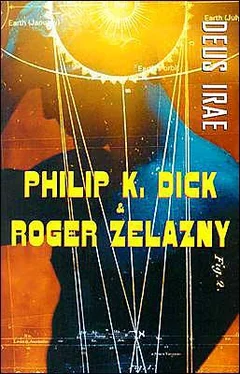The worm did not answer. Its eyes still open, it had died.
Tibor reached with a manual extensor; he dipped his “hand” in the oily slime of the worm, an idea coming to his head. If the slime was truly oily, perhaps he could soak the wheel bearings with it, give them a shield of lubrication. But then something that the worm had said popped up within his mind, an interesting point. The worm had said, “Leave me to my sleep upon my possessions.” What did it possess?
He cautiously navigated his cart around the side of the dead worm, prodding the cow expertly with his pseudowhips.
Beyond the tangle of shrubbery—a cave in the side of a rocky hill. It reeked of the worm slime; Tibor got out a handkerchief and held it before his nose, trying to reduce the smell. He then snapped on his light, shone it into the cave.
Here, the worm’s possessions. An overhead fan, totally rusted and inactive, piled up on the top of the heap. Under it, the body of an ancient surface auto, including two broken headlights and a peace sign on its side. An electric can opener. Two wartime laser rifles, their fuel supplies empty. Burned out bedsprings from what had once been a house; he saw, now, the window screens from the house, like everything else, rusting away.
A portable transistor radio, missing its antenna.
Junk. Nothing of worth. He rolled his cart forward, picking at the cow; the cow swished her tail, turned her heavy head back in protest, and then stumped on, closer to the foul, rotting cave.
Like a crow, Tibor thought. The worm piled up everything shiny it could find. And all worthless. How long had it curled up here, protecting its rusting junk? Years, probably. Ever since the war.
He perceived other trash, now. A garden hoe. A large cardboard poster of Che Guevera, tattered and dim from long neglect. A tape-recorder, without a power source and missing its tape reels. An Underwood electric typewriter, bent with excessive damage. Kitchen utensils. A cat-carrying cage, caved in, its wire sides jabbing up like a garden of spikes. A divan, molting its Naugahide surfaces. A floor ashtray. A pile of Time magazines.
That did it. The worm’s wealth ended there. All that plus the springs from a bed. Not even the mattress: just the grotesquely bent metal coils.
He sighed, keenly disappointed. Well, at least the worm was dead, the great dark worm who had lived in this cave, protecting his worthless acquisitions.
The bird who had sung hymns came fluttering over the branches of the nearby trees. It hovered, then landed, its bright eyes fixed on him. Questioningly.
“You can see what I did,” Tibor said thickly. The corpse of the worm had already begun to stink.
“I can see,” the bird said.
“Now I’m able to understand you,” Tibor said. “Not just fragments repeated back—”
“Because you dipped your hand into the excretion of the worm,” the bird said. “Now you can understand all the birds, not just me. But I can tell you everything you need to know.”
Tibor said, “You recognize me?”
“Yes,” the bird said, hopping down to a lower, sturdier branch. “You are McMasters Tibor.”
“Backwards,” Tibor said. “Tibor is my first name; McMasters my second. Just turn it around.”
“All right,” the bird agreed. “You are on a Pilg, searching for the God of Wrath, so you can paint his likeness. A noble errand, Mr. Tibor.”
“McMasters,” Tibor said.
“Yes,” the bird agreed. “Anything you say. Ask me if I know where you can find him.”
“You know where he is?” Tibor said, and within his chest his heart labored once more, a fierce cold pressure that injured him by its presence. The idea of finding the Deus Irae paralyzed him, now; it seemed to be an actual presence, not a potential one.
“I know,” the bird said calmly. “It is not far from here; I can easily lead you there, if you wish.”
“I—don’t know,” Tibor McMasters said. “I’ll have to—” He became silent, pondering. Maybe I should turn back, he thought. In fact maybe I’ve already gone too far. There have been several attempts to kill me… maybe I should heed the hints. Maybe reality is trying to tell me something. “Wait,” he said, still pondering to himself. Still not answering the bird.
“Let me tell you a little more,” the bird said. “There is someone following you. Pete, his name is.”
“Still?” Tibor said. He did not feel surprise, only a dull sense of alarm. “Why?” he demanded. “What for?”
“I can’t determine that,” the bird said, thoughtfully. “You will find out presently, I would think. In any case he means you no harm, as the expression goes. How goes it with you, Mr. Tibor? Can you tell me now?”
Tibor said, “Can you tell me what will happen if I come across the God of Wrath? Will he kill me, or anyhow try to kill me?”
“He will not know at first who you are or why you have found him,” the bird declared. “Take it from me, Mr. Tibor; he no longer believes that—how shall I say it? That anyone malignly oriented is still on his trail. Too many years have gone by.”
“I suppose so,” Tibor said. He took a deep, shuddering breath, to fortify himself. “Where is he?” he said aloud. “Take me in that direction, but very slowly.”
“A hundred miles north of here,” the bird said. “You will either find him or someone who looks like him… I’m not sure which it is.”
“Why can’t you tell?” Tibor asked. “I thought you’d know everything.” The bird’s poor mentality depressed him. I have sipped on the worm’s slime, he thought, and I have escaped from a series of dangers, and what did I get out of it? Almost nothing, he realized. A bird that partially talks… that partially knows something.
Like myself, he thought. We each know a little. Maybe if I can add what this bird knows to what I know… sui generis. I can try.
“How does he look?” he asked the bird.
“Pretty bad,” the bird answered.
“How?”
The bird said, “He has bad breath. His teeth are missing and yellow. He is stoop-shouldered and he is old and fat. Thus must you draw your mural.”
“I see,” Tibor said. Well, so it went. The God of Wrath was as much a prey to mortal decline as anyone else. All at once he had become all too human. And how would that help the mural?
“Is there nothing exalted about him?” Tibor asked.
“Maybe I have the wrong man,” the bird said. “No, there is nothing exalted about him. Sorry to say.”
“Christ,” Tibor said bitterly.
“As I say,” the bird said, “I may well have the wrong man. I suggest you take a long close look at him, yourself, and rely on what you determine, not on what I’ve said either way.”
“Maybe so,” Tibor murmured. He still felt depressed. Too much plucked at him, and too much lay ahead. Better to turn around and go back, he decided. To get out of this while he still could. He had been lucky. But perhaps his luck had drained away; after all, he could not continue testing it forever.
“You think your luck has run out?” the bird said perceptively. “I can assure you it hasn’t; that’s one thing I do know. You will be all right; trust me.”
“How can I trust you if you don’t even know it’s him?”
“Hmm,” the bird said, nodding. “I see what you mean. But I still stick with what I say: your luck has not run out, not at all. Give me credit for knowing that, at least.”
“What kind of bird are you?” Tibor asked.
“A blue jay.”
“Are blue jays generally reliable?”
“Very much so,” the bird said. “By and large.”
Tibor said, “Are you the exception that proves the rule?”
Читать дальше








